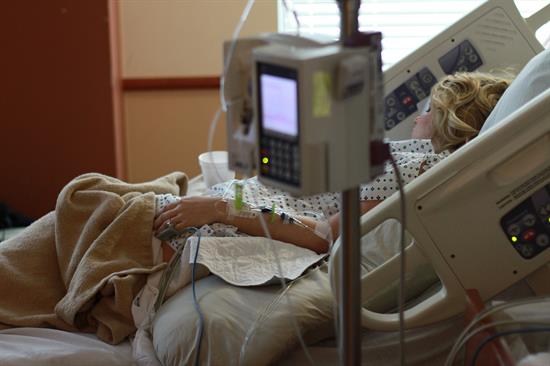ARE YOU THE PROBLEM? 5 TIPS TO ENCOURAGE CIVILITY IN THE CLASSROOM
May 29, 2019, 17:51 PM
<6-min. read> Do your students respect you? Or are they afraid of you? There’s a difference. And nurse educators who don’t understand that difference can impact students in extremely harmful ways.
 The first day of class, the nurse educator stood before her students and addressed them very directly.
The first day of class, the nurse educator stood before her students and addressed them very directly."Look around you,” she said. “Look to your right. Look to your left. At the end of this experience in your nursing education, a whole bunch of you aren't going to be here, because you're going to be failing out of the program."
Her intentions were probably good. She wanted students to understand that the journey ahead wouldn’t be easy. The impact of her words, however, likely had the opposite effect of what she expected.
 “Those kinds of messages leave learners feeling very vulnerable,” says Cynthia Clark, PHD, RN, ANEF, FAAN, strategic nursing advisor for ATI. “We already know that students — under the best of circumstances — have a lot of stressors.” Yet, after hearing such an admonition, she explains, students are likely to feel even greater stress, along with feeling vulnerable and on guard.
“Those kinds of messages leave learners feeling very vulnerable,” says Cynthia Clark, PHD, RN, ANEF, FAAN, strategic nursing advisor for ATI. “We already know that students — under the best of circumstances — have a lot of stressors.” Yet, after hearing such an admonition, she explains, students are likely to feel even greater stress, along with feeling vulnerable and on guard. Add the stress faculty themselves feel with the problem of poor communication skills — among both students and educators — she adds, and you create a “cauldron” that can escalate into challenging or threatening incidents.
“When you have that collision course of stressors — stress of students, stress of faculty, and stress from the challenging practice of nursing — that intersect is where incivility can happen,” she says.
Be proactive to encourage civility
Despite your best intentions, you, too, may be unintentionally creating opportunities for incivility to occur. But you can take proactive steps to reverse that atmosphere and create a joyful, positive experience instead. Consider these tips from Dr. Clark.1) Role model positive behavior.
Students pay attention to your words and actions, even when you aren’t in front of the classroom. So, being self-aware of your interactions with them and colleagues is crucial. “When faculty and staff are not behaving in ways that are conducive to a healthy academic and work environment, it can impact students,” Dr. Clark explains. “Students see us displaying that behavior, suggesting this is acceptable behavior. We are unintentionally enculturating students to behave in ways that undermine the work environment and adversely affect patient care.
“When faculty and staff are not behaving in ways that are conducive to a healthy academic and work environment, it can impact students,” Dr. Clark explains. “Students see us displaying that behavior, suggesting this is acceptable behavior. We are unintentionally enculturating students to behave in ways that undermine the work environment and adversely affect patient care.“It's sort of like a family,” Dr. Clark adds. “If the grown-ups in the family are acting out, over time, that’s going to have an impact on how the children behave, and how they’re impacted, and how they’re affected. That analogy carries over into the workplace where the faculty and staff and others are acting out. It’s ultimately going to have an impact on students.”
Take care, then, to think before you act or speak. Give yourself a moment to make sure students emulate professional and respectful behavior.
2) Display an enthusiastic attitude — even in the worst of circumstances.
Getting frustrated is a natural reaction to situations in which you expect a higher level of understanding among your students and see them making obvious errors. But channeling that frustration into constructive feedback is crucial to building students’ confidence. “When faculty are uncivil or demeaning to students, the outcome can be devastating,” Dr. Clark says. She’s heard educators make comments such as, “Whoever said you can be a nurse?” “Why are you even trying to do this?” and “You're never going to make it through this program to become a nurse!”
“When faculty are uncivil or demeaning to students, the outcome can be devastating,” Dr. Clark says. She’s heard educators make comments such as, “Whoever said you can be a nurse?” “Why are you even trying to do this?” and “You're never going to make it through this program to become a nurse!”“Imagine the impact those words have when you’re already feeling somewhat vulnerable in your student role,” she adds. She suggests setting the bar with high expectations for your students, providing them with resources to achieve, encouraging their success, and then delivering direct, constructive feedback in a respectful manner when they make an error.
3) Assume positive intent.
“Sometimes, I might act in a way with you that you might perceive as rude or disrespectful, like making an offensive comment. But that may not have been my intent at all,” Dr. Clark says. When you encounter such comments — whether from a student or colleague — she, advises, stop and ask, “Is that type of comment typical of this individual?” If it’s not, you may just chalk up the unnatural negativity to someone simply having a bad day and give them the benefit of the doubt. However, if you are troubled by the comment, by all means, check it out and make an honest attempt to resolve the issue.4) Look for patterns of behavior.
While you can quickly forgive the singular disrespectful comment, if you identify a pattern of unconstructive sentiments, it’s time to act. “When a person is making regular unconstructive comments, that invokes some sort of response for us to sit down and have a conversation to resolve the issue,” Dr. Clark says. “Doing so will be helpful to an individual’s personal life and also professional life,” Dr. Clark adds. “Because, when we aren’t speaking up — in the patient-care environment, as one major example — it can have devastating effects on patients. So, we might see something happening to a patient that may result in harm. And, for some reason, which sometimes happens, we’re not speaking up. We’re not advocating. We’re not finding that moral courage. Ultimately, that’s going to impact our patient situation and cause harm — maybe even death — to a patient. So an extreme like that, we have much to fix so that those things don’t happen.”
“Doing so will be helpful to an individual’s personal life and also professional life,” Dr. Clark adds. “Because, when we aren’t speaking up — in the patient-care environment, as one major example — it can have devastating effects on patients. So, we might see something happening to a patient that may result in harm. And, for some reason, which sometimes happens, we’re not speaking up. We’re not advocating. We’re not finding that moral courage. Ultimately, that’s going to impact our patient situation and cause harm — maybe even death — to a patient. So an extreme like that, we have much to fix so that those things don’t happen.”Take time to help students build that confidence and practice addressing these types of situations so they’ll be likely to address incivility in others and be more likely to recognize it in themselves.
5) Create a just culture.
“Some of my studies have shown that, in some cases, students are being dishonest about what they’re doing in the patient-care area,” Dr. Clark reports. She describes students who report changing a sterile dressing, checking blood sugar levels before dosing insulin, and taking blood pressure before starting a new medication. In reality, however, the students performed none of those duties. “This should scare all of us,” she says. “When I ask students what would motivate that behavior — because they know it’s wrong,” Dr. Clark says. “Maybe a very tiny, itsy bitsy percentage of people may not see that it’s wrong. But almost 100 percent of us would say, ‘Yeah, that’s wrong to lie about or be deceitful about providing a procedure to a patient.’ So, when I start to pull back those layers in my research and ask what’s motivating them, almost always it’s because the stakes are too high.”
“When I ask students what would motivate that behavior — because they know it’s wrong,” Dr. Clark says. “Maybe a very tiny, itsy bitsy percentage of people may not see that it’s wrong. But almost 100 percent of us would say, ‘Yeah, that’s wrong to lie about or be deceitful about providing a procedure to a patient.’ So, when I start to pull back those layers in my research and ask what’s motivating them, almost always it’s because the stakes are too high.”She says students fear that if they admit to such deceits, they will be reprimanded or even kicked out of their nursing programs. “They’re unwilling to take that risk,” she explains. “They’ve invested too much — money, time, resources. They tell themselves they’d rather take their chances and not reveal an error.
“That’s terrifying to me.”
A remedy to this type of situation is to create a just culture.
In this environment, she says, students (and all health care professionals) are encouraged to self-report and are supported when they bring an error, near miss, or omission forward, knowing they can develop a solution with their faculty member or clinical preceptor to address the situation. This type of situation is truly win-win, because students can learn from their errors.
“You might say to the student, ‘I appreciate knowing about this situation, and I’m glad you brought it to my attention. Let’s work together to problem-solve the best approach to implement this treatment (or procedure), because it is vital to patient care.,’” Dr. Clark suggests.
Ultimately, when it comes to helping support civility in your classroom, you have the greatest influence. Dr. Clark notes, “Faculty are the social architects of the academic culture; it’s up to us to model and lead the way in creating civility and engaged learning environments where everyone is supported and respected.” Use these steps to promote a healthy learning environment for your students and, in the future, a safe practice environment for their patients.
Keep the learning going:
Click the links below to:• Read more about the issue of civility
• Discover solutions to promote and teach civility
• Learn about Dr. Clark
• Check out Dr. Clark’s articles in Sigma’s Reflections on Nursing Leadership magazine.
